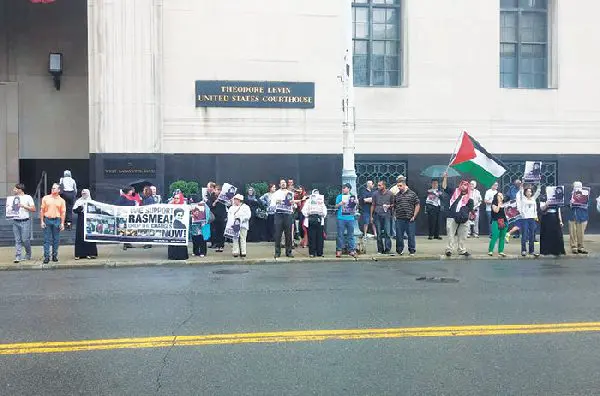
DETROIT — A psychological expert told the judge in Rasmea Odeh’s pre-trial hearing that Odeh could have misinterpreted the questions on her citizenship application because she suffers from chronic Post Traumatic Stress Disorder.
Odeh is accused of lying on her U.S. naturalization application about being arrested and convicted in Israel about 45 years ago.
Dr. Mary Fabri, a clinical psychologist at the Kovler Center in Chicago, explained that people with PTSD often develop filters that helps them avoid reminders of past trauma that caused the disorder. Odeh says she was tortured physically and mentally after her arrest; and that when answering the questions about whether she has ever been arrested or convicted, she thought they were only asking if she had been arrested in the United States.
Fabri explained that it is possible that Odeh could have interpreted the questions that way because torture survivors subconsciously avoid remembering their past trauma.
Asked by Assistant U.S. Attorney Jonathan Turkel if the PTSD victim is conscious of those filter, Fabri said: “No, it’s not something you control; it’s automatic.”
The psychiatrist said Odeh’s PTSD case is “very credible” because of a consistent depiction of the symptoms.
U.S. District Judge Gershwin A. Drain will decide whether Fabri can testify in front of the jury.
Competing motions
The prosecution and defense locked horns, in Tuesday’s pretrial hearing, over the admissibility of evidence from an Israeli military court that convicted Odeh in 1969.
Defense attorney Michael Deutsch argued that the judicial practices of the Israeli court that tried Odeh violate the U.S. Constitution; thus evidence from the case should not be introduced in front of the jury.
Deutsch said Israeli officers used electric shocks and beat and sexually abused Odeh until she confessed to participating in two bombings on behalf of the Popular Front of the Liberation of Palestine (PFLP). He added that the judges in the Israeli military courts were military officers themselves.
“We cannot accept evidence from this justice system that’s based on torture and denial of fundamental fairness,” he told the judge. “It is against our Constitution.”
Turkel argued that the Mutual Legal Assistance Treaty between the United States and Israel allows Israeli legal documents to be introduced in American courts. He added that signing treaties is a power of the executive branch that cannot be overturned by the judiciary.
The defense replied that the U.S. Constitution supersedes any treaty or legislation.
The prosecution also made the case for telling the jury that Odeh was convicted of terrorism in Israel.
Drain ruled last week that the prosecution has to prove that Odeh lied on her application for the specific intent of procuring U.S. citizenship. Special Assistant U.S. Attorney Mark Jebson said mentioning Odeh’s terrorism conviction is essential to the prosecution’s argument, because immigrating legally to the United States is the first prerequisite to obtaining citizenship. He added that an immigration expert would testify during trial that Odeh would have been denied a visa to the United States because of “involvement in terrorist activity.”
Deutsch objected to the term “terrorism”, saying that it is prejudicial and would prejudice the jury against the defendant. He added that if terrorism were to be mentioned, he would try to prove that the Israeli conviction was unfair and based on torture.
Drain said he does not want to retry Odeh’s conviction in Israel, but rather focus on the charges leveled against her here.
Hatem Abudayyeh of the Rasmea Defense Committee said the prosecution’s plan to mention that Odeh engaged in terrorist activity is political.
“They are ideologues,” Abudayyeh said of the prosecuting attorneys. “They made a career out of prosecuting ‘terrorists.'”
“The prosecution wants to use the word to sway the jury against Rasmea, even though it has nothing at all to do with the alleged immigration fraud,” said Muhammad Sankari, one of the spokespeople for the Rasmea Defense Committee. “They have hired Matthew Levitt, a discredited ‘terrorism expert’, to testify against Rasmea. He is a director at the Washington Institute for Near East Policy, a think tank funded by the American Israel Public Affairs Committee (AIPAC) and has made a career out of fear mongering, scapegoating, and attacking the Arab, Palestinian, and Muslim communities. We are concerned that the prosecutors are doing the same.”
The prosecution filed a motion asking Drain to reconsider his decision that “specific intent” must be proven to convict Odeh. The judge asked the defense attorneys to write a detailed response.
“Rasmea’s supporters were disappointed to hear that the judge agreed to look at the question again,” Rasmea’s Defense committee said in a statement.
No anonymous jury
Drain ruled against the prosecution’s request for an anonymous jury last week.
Quoting Abudayyeh as saying that Odeh’s supporters’ protests in front of the courthouse before hearings could sway the opinion of the jury, the prosecution argued that the names of the jurors should remain unknown to both the defense and the public.
“Mr. Abudayyeh and others have demonstrated in front of the courthouse whenever there is a scheduled proceeding in this matter,” reads the prosecution’s motion. “The government argues that this conduct is an improper attempt to influence the jury, is criminal and without constitutional protection.”
The judge ruled that the situation does not require an anonymous jury, but warned the defendant’s supporters not to contact the jurors.
He also ruled that the jurors would be brought to the courthouse from a prearranged location by federal marshals, so they don’t come in contact with Odeh’s supporters’ demonstrations.
In his ruling, Drain said federal marshals will cooperate with Detroit police to make sure that the protests do not violate the law.
The demonstration before the hearing on Tuesday, which was the first after the ruling, went on without interruption or complaints from law enforcement agents.






Leave a Reply